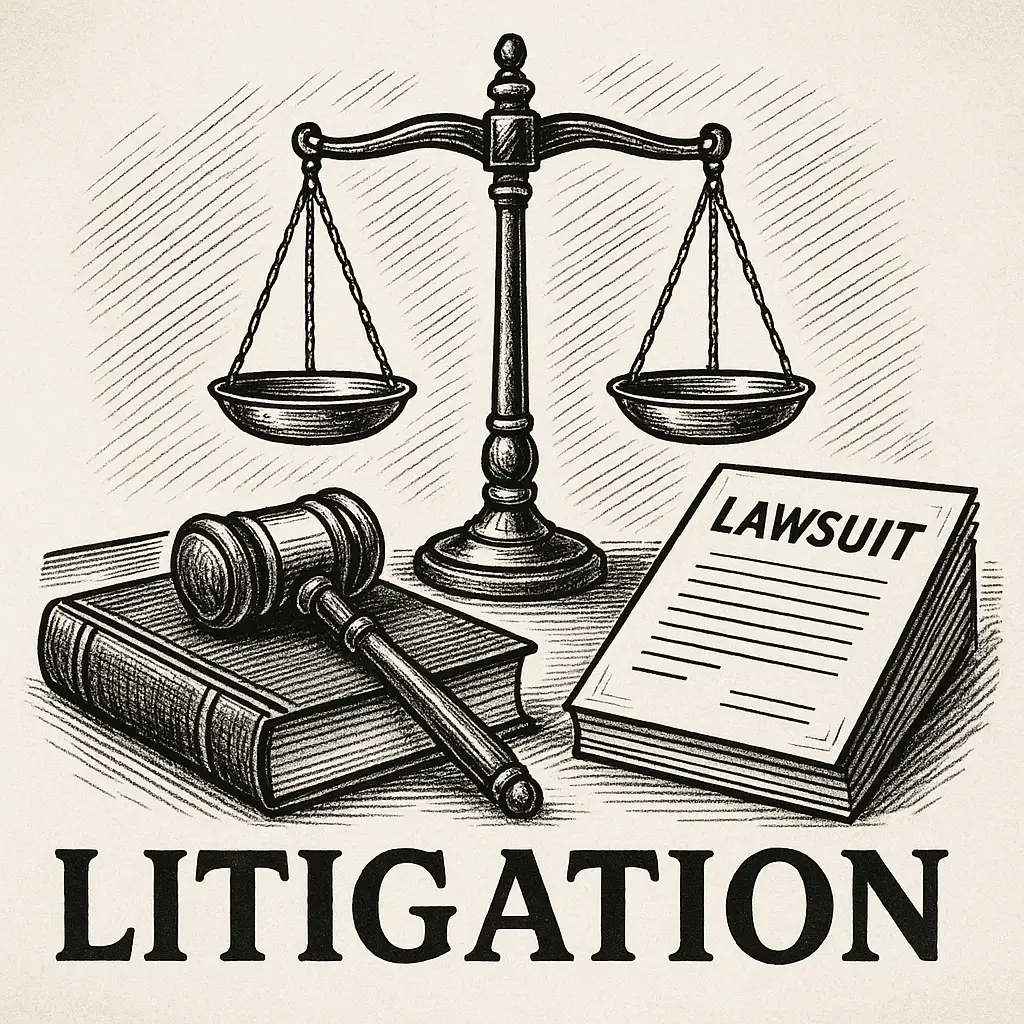Legal actions and litigation in Costa Rica. ☎️ Do you wish to sue in Costa Rica?
Litigation in Costa Rica is carried out through the exercise of legal actions. Costa Rica respects the right to file any action, which is a natural right. It consists of a legal power to request the satisfaction of a claim to the jurisdictional organs of the State. Filing a lawsuit in Costa Rica, is exercising a legal action. A lawsuit must always be comprehensive to sustain your claim. I am Dr. Christopher Pirie, a procedural litigator, with legal practice in Costa Rica.
The Costa Rican legal system operates under a very organized set of principles and its judiciary is well-regarded for independence and transparency. Whether you’re an individual, a business owner, or an international entity, understanding the litigation process in Costa Rica is highly encouraged.

How is the Judicial System organized in Costa Rica?
Roughly speaking, the judiciary is organized into several levels:
- Trial Courts (Juzgados de Primera Instancia): These courts handle the initial stages of most civil, criminal, and administrative cases. They are the courts of first instance where lawsuits are filed.
- Appellate Courts (Tribunales de Apelación): If a party is dissatisfied with the outcome of a trial court’s decision, the law determines, if an appeal can be placed. In such cases, the appellate courts, review the legal and factual aspects of the case, in accordance to what was appealed.
- The Supreme Court of Justice (Corte Suprema de Justicia): As the highest court in Costa Rica, it serves as the ultimate judicial authority. It includes specialized chambers (Salas) that deal with cases corresponding to various areas of law. The “Sala Primera” overviews civil and agrarian cases. The “Sala Segunda” has oversight over family and labor cases. The “Sala Tercera” over criminal actions and finally the “Constitutional Court” or “Sala Cuarta” has oversight over Habeas Corpus and other constitutional actions.
So you wish to sue in Costa Rica?
If you wish to file a lawsuit, the first thing to consider is that type. What kind of legal action will you exercise? Will it be a family lawsuit? Perhaps a civil action? Maybe you wish to be part of a class action lawsuit? Costa Rica has different subject matter jurisdictions, so establishing this is important.
It´s also vital to file the lawsuit in the correct territorial circumscription. The law has guidelines to establish subject matter territorial jurisdiction. This matters to legally ascertain in which province of Costa Ric to file: whether in San José, Guanacaste, Limón, Cartago, Heredia, Alajuela, or Puntarenas.
What does a lawsuit in Costa Rica entrail?
A lawsuit is an act in which the plaintiff initiates a judicial process with a specific legal claim against someone else. The lawsuit is the exercise of legal action. For example, a civil lawsuit is a claim due to a civil law violation. A family lawsuit is a claim due to a breach of family law. The same would be valid for a labor lawsuit and so on. When you file a lawsuit, you exercise the power and the right to legal action. The lawsuit forces the State apparatus, and a judicial process is initiated. A Judge with jurisdiction will resolve the legal dispute.

Civil Litigation:
At CPG Legal, we represent individuals and businesses in all kinds of civil actions in Costa Rica. Civil law governs disputes between private parties and provides legal remedies for the enforcement of rights, recovery of debts, compensation for civil damages, and protection of property and contractual interests. Legal actions in Costa Rica are claims brought by individuals or entities to protect or enforce their private rights. These actions encompass a broad range of disputes, including contract breaches, property claims, and personal injury matters.
Commercial Litigation:
This type of litigation deals with disputes between business relationships and commercial acts and transactions. Common cases include:
Corporate Disputes: Conflicts between shareholders, corporations, partners, or directors.
Breach of Commercial Contracts: Failure to comply with agreements related to goods or services.
The most important aspect of commercial or civil litigation is determining which laws apply to which case. For example, in a civil case where a commercial dispute is being decided, the Commerce Code regulates case-specific aspects that differ from the Civil Code. An example is the statute of limitations. It´s four years for commercial claims but 10 years for civil claims.
Criminal or Penal Litigation in Costa Rica:
Criminal litigation deals with crimes and the legal punishment of criminal offenses. Depending on the type of crime, a criminal or penal action is initiated by the State, such as when a homicide has occurred. Penal complaints (denuncias), are filed at the Public Procesuctor´s office or Ministerio Público. In other types of criminal offenses, the State can´t begin the proceedings without a criminal complaint or “denuncia”, by the victim. An example is a case of fraud, where the victim must engage by filing a complaint for the wheels of justice to begin moving. A criminal action is initiated by the State, or by the complaint, for crimes such as:
- Fraud and Financial Crimes: Money laundering.
- Theft or Property Damage: Burglary, robbery.
- Violent Crimes: Homicide, drug trafficking.
Labor Litigation:
Labor lawsuits focus on employment disputes, ensuring compliance with Costa Rica’s robust labor protections. Key cases include:
Wrongful Termination: Claims for severance pay, compensation, or reinstatement.
Unpaid Wages and Benefits: Lawsuits to recover salaries, bonuses, or vacation pay.
Workplace Injuries: Compensation claims under Costa Rica’s workplace safety laws.
Labor courts tend to favor employees, making it critical for employers to strictly adhere to legal obligations.
Family Litigation in Costa Rica:
Family litigation in Costa Rica addresses divorce, child custody, child and spousal support, property division, and paternity cases. Handled under Costa Rican Family Law, these matters prioritize the child’s best interest and uphold principles of equality and access to justice.
Key points include:
- Divorce: Divorce in Costa Rica can be contested or by mutual agreement, often starting with mediation.
- Child Custody: Courts favor shared or sole custody based on the child’s well-being, granting visitation rights to non-custodial parents.
- Child & Spousal Support: Financial obligations are determined based on needs and income, with strict enforcement like wage garnishment for non-compliance.
- Property Division: Unless otherwise agreed, marital assets acquired during the marriage are sold, and the proceeds are divided equally.
- Paternity & Guardianship: DNA testing establishes parentage, and courts handle guardianship for minors or vulnerable individuals.
- Domestic Violence: Protective measures, restraining orders, and expedited procedures ensure safety and justice.
Agrarian Litigation in Costa Rica:
Agrarian litigation in Costa Rica resolves land ownership, tenancy, rural property rights, and land use disputes. The key factor to determine subject matter jurisdiction, is if the property is used for agricultural purposes, or raising animals. If the land is used for these purposes, all claims must be resolved by the Agrarian Jurisdiction. The Agrarian Courts handle cases such as:
- Land Ownership & Boundaries: Title disputes, illegal occupations, and adverse possession claims (usucapión).
- Tenancy Issues: Lease agreements, unpaid rents, and evictions.
- Environmental Conflicts: Improper land use, deforestation, or water contamination.
- Expropriation: Disputes over state acquisition of land for public purposes.
Costa Rican agrarian law prioritizes the social function of land, protects small farmers, and promotes sustainable agricultural practices.
Administrative Litigation:
Administrative lawsuits involve disputes between individuals or businesses and government authorities. These include:
Challenging Government Decisions: Contesting permits, fines, or sanctions issued by regulatory bodies.
Public Contract Disputes: Conflicts regarding government tenders or contracts.
Tax Litigation: Appeals against tax assessments or penalties imposed by tax authorities.
Administrative litigation is handled by specialized courts and often requires thorough documentation to overturn government decisions.
Is a judicial process possible without exercising legal action through a lawsuit?
It depends! The vast mayority of trials in Costa Rica, begin with a lawsuit that is filed. However, there are some exceptions, like in Transit and Criminal Law. In some felonies, the criminal legal action is begun without even a complaint, as a public action, with knowledge of a “notitia criminis” or “news of a crime.”
This, however, is not the case in any civil case, which requires a formal lawsuit for the process to initiate. There is no process without the law suit; the plaintiff´s initiative is necessary to start the civil proceedings.
I need to file a law suit outside of San José. Can you help me?
Yes of course. I gladly provide legal representation in all provinces of Costa Rica. So if your law suit must be filed and handled outside of San Jose, this won´t be an issue at all. My legal representation is given in all provinces of Costa Rica: San Jose, Alajuela, Heredia, Cartago, Puntarenas, Guanacaste and Limon. Learn more about our general legal services in Costa Rica.
What other things should I know, when I file a lawsuit in Costa Rica?
Your attorney will draft the law suit in Spanish for you, and you’ll need to sign it. This is where bilingual communication is critical. Your lawyer must understand you perfectly so there are no mistakes. Once you sign the lawsuit, your attorney must authenticate your signature. This will make him the legal director of your case. If you can´t sign and wish to relinquish the process to your lawyer, you can give him a special judicial power of attorney to represent you.
Litigation in Costa Rica reflects the country’s strong commitment to the rule of law and judicial independence. The process for filing a lawsuit, from the initial complaint to trial and appeals, is well-structured but can be time-consuming. Costa Rica’s emphasis on legal formality and civil law principles requires litigants to follow strict procedural rules, making the assistance of experienced legal counsel essential.
Dr. Christopher Pirie Gil.
CPG LEGAL.